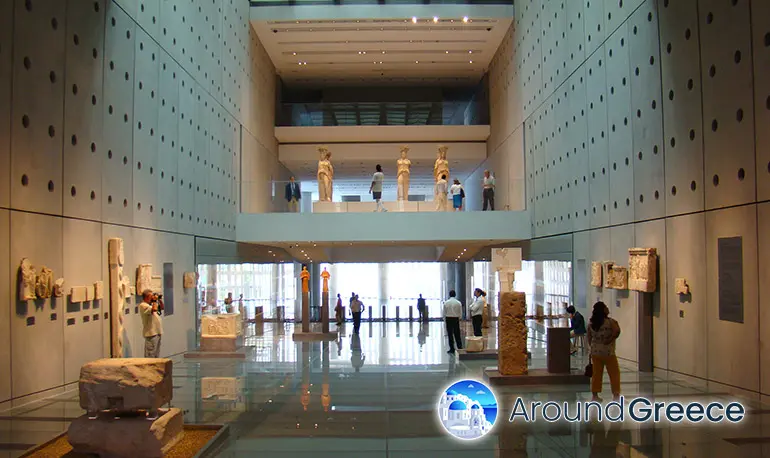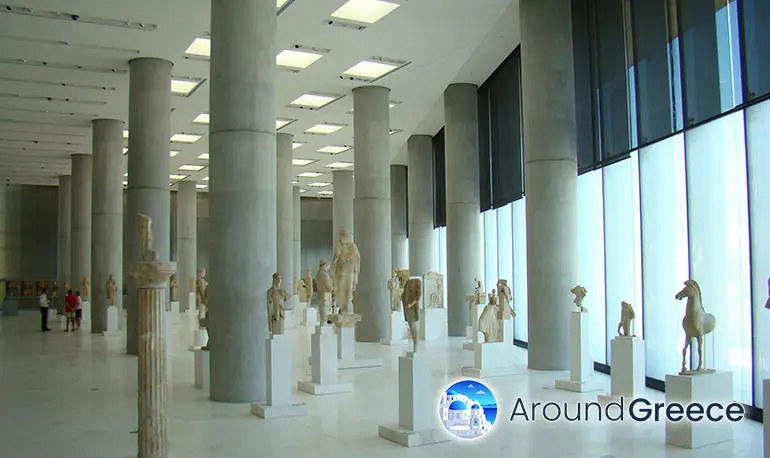One of the World's Best Museums
The "New" Acropolis Museum was officially opened on the 20th June 2009. Designed by Swiss-born architect Bernard Tschumi, it measures 14,000-square-meters and houses more than 4000 unique and pricesless artifacts, dating back to the 5th century B.C.

Some of the sculptures that are on display are being shown for the first time, as the old Acropolis Museum had limited display space meaning that many objects had been kept in storage all these years. Now in their new home, they are being displayed together with other sculptures, artifacts and pieces of art. It is hoped that eventually, the Parthenon Marbles will eventually be returned back to Athens and be reunited with the marbles and sculptures that Elgin was unable to plunder.
The museum is spread over three levels and it was during the construction of the museumthat old ruins that were discovered that are an important part of ancient Athens. These ruins have been exceptionally well preservered and offer visitors an insight into the everyday activities of ancient Athenians, as well as showcasing a variety of archtectual periods. The ruins include the remains of workshops, private villas, bathhouses and cisterns.
Upon entering the museum, visitors will see the slope, resembling that of the slope leading up to the acropolis. The first floor of the museum exhibits statues and artifacts from the pre-Parthenon period, dating from the 6th century B.C.

The Archaic gallery showcases a stunning selection of beautiful sculptures, and exhibits these pieces of art in such a way as to allow visitors a 360 degree view of the pieces, rather than have them displayed with their backs against the wall. Some of the stunning sculptures and works you can see here include the "Peplophoros Kore", the "Pediment of the Archaic Parthenon or Hekatompdeon", and many others.
Located on their own balcony area, overlooking the entrance slope to the museum are the majestic caryatids, the female statues that propped part of the Erectheum, until they replaced by replicas. The Acropolis Museum has 4 of the 5 Caryatids, whilst the 5th is currently being held in London at the British Museum ( along with the Parthenon marbles ). These stunning statues are displayed in a way that you can see them from all angles.

The detail of the hair on these statues is truly amazing, and it is actually the first time that one can see the back of these statues - even when they were supporting the Erectheum on the Acropolis, their backs were hidden and out of view.
Though the museum comprises of many special points of interest and highlights, one of the main ones can be found on the top floor of the museum - the Parthenon gallery. This stunning part of the museum, with the glass walls all around, is angled to face the Parthenon temple, which is located just 244 meters away. It is here that all of the sculptures from the Parthenon are displayed together for the first time.
Mounted around the gallery is the 160 meter frieze that depicts a religious procession that is displayed in the same sequence as it would have originally been displayed on the temple. Some sections of the frieze have been replaced with plaster copies, which fill in the empty spaces left by the original sections of the frieze which were stolen in the early 19th century and which have been on display in the British Museum since 1816.

The request by Greek governments through the years for the return of the Parthenon marbles has continuously fallen on deaf ears, with a popular excuse from the British Museum being that Athens has nowhere to house the marbles. This excuse has now been made redundant by the opening of the new Acropolis Museum. For the first time since the sculptures and marbles were stolen, there is now the perfect place in which to reunite these stunning pieces of art, and allow visitors to see them complete, how they were always intended to be displayed.
Once you have visited the new Acropolis Museum, you will see that the return of the marbles to Athens is something that simply must be carried out. The Parthenon Marbles have spent the last 200 years away from where they were originally intended to be. Whatever opinion one has with regards to Lord Elgin or the British Museum, the fact is that there has never been a more perfect moment than right now for these marbles to finally be returned back to Athens, and to heal the wounds of the temple.
The Parthenon Marbles are a symbol not just for Greece, but for all of the world. The unification of these marbles is a request not just from Greeks, but from individuals of all backgrounds from all over the world, who would like to see one of the most impressive and important pieces of ancient art, complete again and on view to the world in the city that they belong.
Information about the Acropolis Museum
Opening Hours
Summer Period (1 April - 31 October)
Mon: 08:00 - 16:00 (last admission: 15:30)
Tue/Wed/Thur: 08:00-20:00 (last admission: 19:30)
Fri: 08:00 - 22:00 (last admission: 21:30)
Saturday/Sunday: 08:00 - 20:00 (last admission: 19:30)
Winter Period (1 November - 31 March)
Mon - Thur: 09:00 - 17:00 (last admission: 16:30)
Fri: 09:00 - 22:00 (last admission: 21:30)
Sat/Sun: 09:00 - 20:00 (last admission: 19:30)
Public Holidays
The Museum is closed on the following dates: 1 January, 6 January, 25 March, Orthodox Good Friday, Easter Monday, 1 May, Whit Monday, 15 August, 28 October, 25 December & 26 December.
Location of the Museum
The main public entrance to the Museum is from the pedestrian walkway of Dionysiou Areopagitou Street. A bus drop off point for groups is available at Hatzichristou Street. Visitors arriving on tour buses enter from the Hatzichristou Street entrance and make their way to the main public entrance (on the Dionysiou Areopagitou side of the Museum). The nearest Metro station is "Acropolis", which is located just a minutes walk from the museum.
Tickets for the Acropolis Museum
Visitors will be able to purchase tickets for entrance at the museum, as well as online via the museums online booking system. The price per ticket is 5 Euros. Reduced admission fee is 3 Euros per ticket.
There is Free Admission to the museum on the following days ....
6 March (In memory of Melina Mercouri), 25 March, 18 May (International Museum Day), 28 October